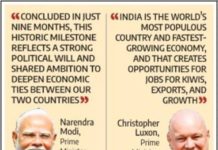MARKET PERSPECTIVE
By J Mulraj
May 20-26, 2023
Same old, same old…doesn’t work
One of the weaknesses of the multiparty federal democracy of India is the propensity of politicians to make pre-election promises of freebies, in order to get elected. This is because they are not footing the bill for the freebies. The State is. The electorate, despite knowing that there is no free lunch, accepts such promises, and votes them in. The fiscal indigestion comes later. Today, Bihar has a deficit of 8.8% of state GDP and Punjab 5.2%. Continuing fiscal deficits are untenable. Some out-of-the-box thinking is needed to come out of this race to the bottom of fiscal and governance irresponsibility. Else all states will be driven to bankruptcy.
Can a bill be introduced requiring any political party proposing such pre-election freebies be asked to deposit, up front, say, 25% of the estimated cost of the program, with the RBI. It would rein in foolish promises. It would also rein in the total cost; if the initial estimated cost is exceeded, the party would need to cough up its 25% share.
Can this, or similar, ideas, be considered?
Or take the despicable crossing of floors, thus defeating the electoral mandate, and often resulting in an expensive re-election, before the 5 year term of the legislature. It can be argued that this is the reality of political democracy. But maybe there could be a cost to exercise of such skullduggery. What if a bill was introduced in which, should an elected Government not be allowed to complete its full term, and an early election called, the breakaway faction would forfeit, say, 20% of the votes they gather, making it more difficult for them to be voted in. Like Judas being penalized! Can this, or other ideas, be considered?
The Government should also consider out-of-the-box ideas to deal with its largest item of expenditure, viz interest cost. Last year it paid ₹ 7.31 trillion in interest, representing 3.1% of GDP. The interest burden arises from previous borrowing, to which freebies are a contributory factor. Interest paid is higher than Defense expenditure, which is ₹ 5.93 trillion.
Here is a suggestion, by way of financial engineering. One this columnist has made earlier, but which has fallen on one of these three official organs (a) deaf ears (b) blind eyes or (c) closed minds.
What if Government offers a scheme for investors to buy existing Government bonds, (of a series it nominates say 9.15% bonds maturing Nov 2024, of ₹ 78000 crores), surrender it to RBI, forgoing all rights to interest and repayment, and get, in return, a weighted tax deduction, on the face value of such bonds. Say 3X or 4X the face value, determined such that the investor gains more from the tax deduction than he forgoes in debt servicing. Essentially, the Government would bring down its debt repayment by ₹ 78000 crores, plus its interest on that, till due date, and would sacrifice tax revenue. It’s a time arbitrage for Government, and a tax arbitrage for investors (buyers of the bond would have a higher tax rate than sellers, typically banks with NPAs and making losses). Why not look at ideas for financial restructuring, to bring down debt?
Today several countries, notably US, China and Japan, the three largest economies, are facing unmanageably high debt/gdp ratios. India’s position is relatively better, but can get worse unless the practice of usurping State funds in order to get elected, is nipped. Remember, it is not merely a question of financial resources. Free power to farmers in Punjab has encouraged them to overuse pumps, to provide water for irrigation, and has lowered the water table alarmingly in the State.
USA is now in an alarming situation over its debt. Government debt is about to hit a Congressionally imposed ceiling, and the Government, under Democratic President Biden, needs Congress, under Republican Speaker McCarthy, to get Congress to raise the ceiling. McCarthy rightly demands a Biden plan to cut expenditure, over time, so that the Government doesn’t come begging again! Much like Oliver, who wants more.
Biden is refusing, not because he does not appreciate the need to cut back on social schemes (he does) but because he wants to blame Republicans for forcing him to cut. So, stock markets and investors are in tenterhooks until a debt deal is reached, as it will be (the consequences of not reaching it are unthinkable, for the world). Perhaps one of the positives of the debt ceiling imbroglio may be an early end to the Ukraine war. Should Biden decide not to extend further financial aid, in order to cut expenditure (he would rather do that than cut, say, medicare, or pension benefits) then it would induce Zelensky to negotiate a peace.
For Biden to think McCarthy would blink first, he must be in La La Land.
For Zelensky, with far too few men left to recruit (some 10 m Ukranians are likely to have migrated) to imagine he can win the war, he must be in La La land. Over a quarter of his citizens have migrated to other countries. Those countries which have given military and financial assistance would expect to be repaid. Besides a lot has to spent to rebuild destroyed infrastructure. So, if compelled, it would be in his interest to negotiate.
Last week the BSE sensex added 762 points to close at 62501.
The concerns of investors now are 1. The black swan event of a failure to raise the debt ceiling, 2. The high probability of a US recession, along with other countries, 3. The harm of El Nino, a series of climatic change, which can affect the global economy by $ 3 trillion and the possibility that, in order to divert attention from a faltering economy, Xi Jinping may embark upon a Taiwanese incursion.
To address these, and other issues, we may well run out of boxes!
Picture Source: https://cjp.broadsoft.com/blog/4-out-of-the-box-ideas-for-engaging-your-customers/
Comments may be sent to jmulraj@asiaconverge.com










































COMMENTS